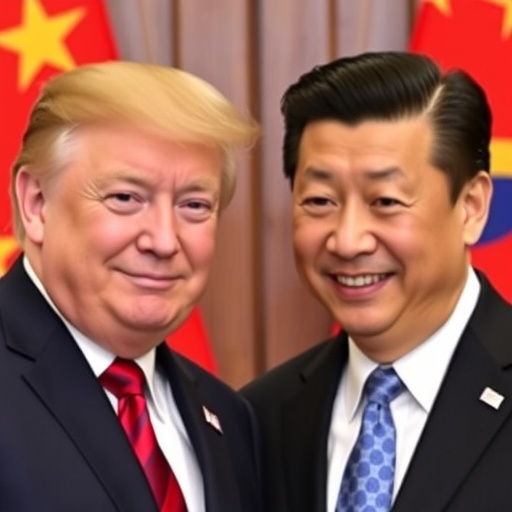Trump and Xi Jinping to Hold Pivotal Trump-Xi Meeting in South Korea for Breakthrough Trade Talks
In a move that could reshape global economic dynamics, President Donald Trump and Chinese President Xi Jinping are set to convene in South Korea for high-stakes trade talks aimed at finalizing a long-anticipated deal. This Trump-Xi Meeting, scheduled for next month, comes on the heels of intensive negotiations that have significantly thawed the frosty relations between the world’s two largest economies, potentially averting further escalation in tariffs and trade restrictions.
The announcement, confirmed by White House officials on Wednesday, underscores a diplomatic pivot toward resolution after years of tit-for-tat measures that have cost businesses billions. Treasury Secretary Scott Bessent, who spearheaded the recent backchannel discussions, described the upcoming summit as a “turning point for fair trade.” With global supply chains still reeling from pandemic disruptions and geopolitical tensions, this gathering in South Korea represents not just bilateral hope but a beacon for international commerce.
Negotiations Gain Momentum Under Bessent’s Leadership
The path to this Trump-Xi Meeting in South Korea has been paved by months of discreet yet productive negotiations led by Treasury Secretary Scott Bessent. Appointed earlier this year, Bessent, a veteran Wall Street financier with deep ties to Asian markets, has been instrumental in bridging the divide. Sources close to the talks reveal that Bessent’s team engaged in over a dozen virtual and in-person sessions with Chinese counterparts since spring, focusing on de-escalating the trade war initiated during Trump’s first term.
Key progress includes preliminary agreements to roll back certain tariffs on agricultural exports, which have plagued American farmers since 2018. According to the U.S. Department of Agriculture, these levies resulted in an estimated $27 billion in lost exports to China between 2018 and 2022. Bessent’s approach, emphasizing data-driven dialogues, has reportedly convinced Beijing to consider easing restrictions on U.S. technology transfers, a sore point in ongoing disputes over intellectual property rights.
“We’ve moved from confrontation to conversation,” Bessent told reporters during a briefing in Washington. “The Trump-Xi Meeting will seal commitments that benefit workers on both sides of the Pacific.” Chinese state media echoed this sentiment, with Xinhua News Agency highlighting Xi’s commitment to “mutual prosperity” amid the trade talks.
These negotiations haven’t been without hurdles. Internal leaks suggest that hardline factions in both capitals pushed back against concessions, but Bessent’s pragmatic style—drawing from his experience at hedge funds like Key Square Capital—helped navigate the complexities. Economists note that this momentum has already boosted investor confidence, with the Dow Jones Industrial Average gaining 2.3% in the week following leaks about the South Korea venue.
Core Agenda: Tackling Tariffs and Trade Barriers in Depth
At the heart of the trade talks during the Trump-Xi Meeting lie the thorny issues of tariffs and trade restrictions, which have ballooned the U.S.-China trade deficit to $367 billion last year, per U.S. Census Bureau data. The agenda, outlined in a joint statement from both nations’ trade ministries, prioritizes phased reductions in duties on key sectors like electronics, automobiles, and pharmaceuticals.
One focal point is the 25% tariff on Chinese imports, imposed under Section 301 of the Trade Act, which Trump has vowed to either eliminate or modify based on reciprocity. In return, the U.S. seeks stronger enforcement against forced technology transfers, a practice that the Office of the U.S. Trade Representative estimates has cost American firms up to $600 billion annually in lost innovations.
Discussions will also address non-tariff barriers, such as China’s regulatory hurdles for foreign biotech firms. A potential breakthrough could involve Beijing granting market access to U.S. companies like Pfizer and Moderna, whose COVID-19 vaccines faced delays due to data localization rules. “This isn’t just about numbers; it’s about leveling the playing field,” said Robert Lighthizer, Trump’s former trade representative, in a recent op-ed for The Wall Street Journal.
Statistics underscore the urgency: The Peterson Institute for International Economics reports that the trade war shaved 0.3% off U.S. GDP growth in 2019 alone, while China’s export-dependent economy saw manufacturing output dip by 5.4%. With inflation concerns lingering post-pandemic, finalizing these trade talks in South Korea could stabilize prices for consumers worldwide, from iPhone components to soybean futures.
Environmental and labor standards may also feature, with the U.S. pushing for commitments to reduce carbon-intensive steel production—a nod to Trump’s “America First” agenda intertwined with green initiatives. Quotes from industry leaders, like Apple CEO Tim Cook, who has lobbied for smoother supply chains, highlight the broad stakes: “Resolving these barriers would unleash innovation and jobs across borders.”
South Korea’s Strategic Role as Diplomatic Host
Choosing South Korea as the venue for the Trump-Xi Meeting adds a layer of geopolitical intrigue to the trade talks. Seoul, a longstanding ally to Washington and a major trading partner to Beijing, offers neutral ground amid the U.S.-China rivalry. The summit will take place at the Blue House in Seoul, the presidential residence, symbolizing Korea’s bridging role in East Asian diplomacy.
This isn’t the first time South Korea has hosted such pivotal gatherings. In 2018, the inter-Korean summit paved the way for U.S.-North Korea talks, demonstrating Seoul’s prowess in facilitating dialogue. President Yoon Suk Yeol, who assumed office in 2022, has actively courted both superpowers, with trade volumes reaching $300 billion annually—$150 billion with each giant.
“South Korea’s selection reflects our commitment to regional stability,” Yoon stated in a press conference. The location also allows for side meetings with Korean business leaders from conglomerates like Samsung and Hyundai, whose semiconductor and auto exports hang in the balance of U.S.-China frictions. For instance, Samsung’s chip division supplies both American tech firms and Chinese assemblers, making it vulnerable to tariff crossfire.
Security arrangements are robust, with U.S. and South Korean forces coordinating amid North Korean provocations. Analysts from the Brookings Institution point out that hosting in South Korea could extend the trade talks’ ripple effects to the Korean Peninsula, potentially easing military tensions if economic ties strengthen. The venue’s choice, therefore, isn’t mere logistics—it’s a calculated step to foster trilateral cooperation in an era of supply chain vulnerabilities exposed by events like the 2021 Suez Canal blockage and Russia’s Ukraine invasion.
Market Ripples and Economic Forecasts from the Trade Talks
News of the impending Trump-Xi Meeting in South Korea has already sent shockwaves through global markets, with Asian indices like the Hang Seng surging 1.8% and U.S. futures pointing upward. Traders anticipate that a deal could add $200 billion to bilateral trade flows within two years, according to projections from Goldman Sachs economists.
The Shanghai Composite Index, sensitive to U.S.-China relations, climbed 3% in the past month on speculation of tariff relief, while soybean prices on the Chicago Board of Trade rose 4%, benefiting Midwestern farmers. Currency markets reflect optimism too: The yuan strengthened against the dollar by 0.5%, signaling Beijing’s confidence in the talks.
However, skeptics warn of volatility. A report from the International Monetary Fund highlights that unresolved issues, like subsidies to Chinese state-owned enterprises, could prolong uncertainties. “While the Trump-Xi Meeting is promising, markets will watch for concrete deliverables,” noted IMF Chief Economist Pierre-Olivier Gourinchas in a recent interview.
Sector-specific impacts are profound. In the tech realm, easing restrictions could boost U.S. exports of semiconductors, a $50 billion market dominated by firms like Intel and Qualcomm. Renewable energy stands to gain as well, with potential pacts on solar panel imports addressing America’s reliance on Chinese manufacturing, which supplies 80% of global panels per the Solar Energy Industries Association.
Broader forecasts suggest a deal could contribute 0.5% to global GDP growth in 2024, per World Bank estimates, by reducing trade costs estimated at 10-15% due to barriers. Investors are positioning accordingly, with exchange-traded funds focused on U.S.-China trade seeing inflows of $1.2 billion last week.
Expert Insights and Stakeholder Reactions to the Summit
As the Trump-Xi Meeting approaches in South Korea, a chorus of voices from policymakers, economists, and industry titans underscores the summit’s gravity. Wendy Cutler, former acting deputy U.S. Trade Representative, emphasized in a CNN analysis: “This trade talks venue could redefine the post-pandemic economic order, but only if both leaders prioritize pragmatism over politics.”
From Beijing’s perspective, Foreign Minister Wang Yi told state television that the gathering aligns with Xi’s vision of a “community with a shared future,” urging the U.S. to abandon “hegemonic mindsets.” U.S. senators, including trade hawk Marco Rubio, expressed cautious support, tweeting: “Watchful eyes on South Korea—America’s interests must come first in any deal.”
Business stakeholders are vocal too. The U.S. Chamber of Commerce, representing 300,000 firms, applauded the progress, citing a survey where 72% of members reported trade war losses exceeding $100,000 annually. Chinese e-commerce giant Alibaba’s executive vice president, in a Bloomberg interview, hoped the talks would “unlock digital trade potentials worth trillions.”
Environmental groups like the Sierra Club added nuance, calling for green clauses in the agreement to counter China’s coal dependency, which accounts for 60% of its energy mix. Labor unions, via the AFL-CIO, demanded protections against offshoring, reflecting domestic political pressures on Trump.
Academic experts provide deeper context. A study from Harvard’s Kennedy School predicts that successful trade talks could reduce unemployment in export-heavy U.S. states like Texas and California by 0.2%, while stabilizing China’s job market amid its property sector woes.
Looking ahead, the Trump-Xi Meeting’s outcomes could set precedents for multilateral forums like the WTO, where reform talks have stalled. If tariffs ease, it might encourage similar U.S. engagements with the EU and India, fostering a more interconnected global economy. Yet, failure looms as a risk, potentially reigniting protectionism and supply chain disruptions. As delegations prepare for South Korea, the world watches, hopeful that this diplomatic endeavor translates into tangible prosperity for billions.








